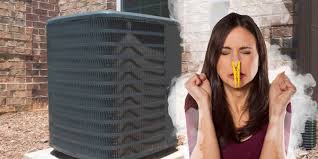
Heat Pumps and Why They Smell
Heat pumps can emit unpleasant odors for several reasons, making them notorious for their occasional foul smell. Understanding these reasons can help homeowners address the issue effectively and maintain a comfortable indoor environment.
One common cause of odor in heat pumps is the buildup of bacteria and mold within the system. Heat pumps operate by transferring heat between the indoor and outdoor environments, creating condensation that can accumulate within the unit. In humid conditions, this moisture provides an ideal breeding ground for bacteria and mold growth, especially in areas such as the evaporator coil and drip pan. As these microbial colonies thrive, they can emit foul odors reminiscent of dirty socks or mildew. Regular maintenance, including cleaning and disinfecting the heat pump components, can help prevent bacterial and mold buildup and mitigate associated odors.
Another potential source of odor in heat pumps is the presence of refrigerant leaks. Heat pumps rely on refrigerant to facilitate heat transfer between the indoor and outdoor units. If a refrigerant leak occurs, it can release noxious gases into the air, resulting in a strong chemical odor. In addition to being unpleasant, refrigerant leaks can compromise the performance and efficiency of the heat pump, necessitating prompt repair by a qualified HVAC technician.
Furthermore, heat pumps may emit odors when the outdoor unit is surrounded by organic debris or vegetation. Leaves, grass clippings, and other outdoor debris can accumulate around the heat pump, obstructing airflow and trapping moisture. Over time, this organic matter can decompose, producing foul odors that are drawn into the heat pump and circulated throughout the indoor environment. Regular landscaping and clearing of debris around the outdoor unit can help prevent this issue and maintain optimal heat pump performance.
Additionally, heat pumps may emit odors during the defrost cycle, particularly in colder climates. During defrosting, the outdoor coil may accumulate frost or ice, which is then melted away by the heat pump's heating cycle. The melting ice can release water and debris that have accumulated on the coil, resulting in a musty or damp odor. While this odor is typically temporary and dissipates once the defrost cycle is complete, homeowners may notice it intermittently during colder weather.
In conclusion, heat pumps can emit odors due to various factors, including bacterial and mold growth, refrigerant leaks, outdoor debris accumulation, and the defrost cycle. Regular maintenance and prompt repair of any issues can help prevent and mitigate unpleasant odors, ensuring the comfort and well-being of occupants in the home.

